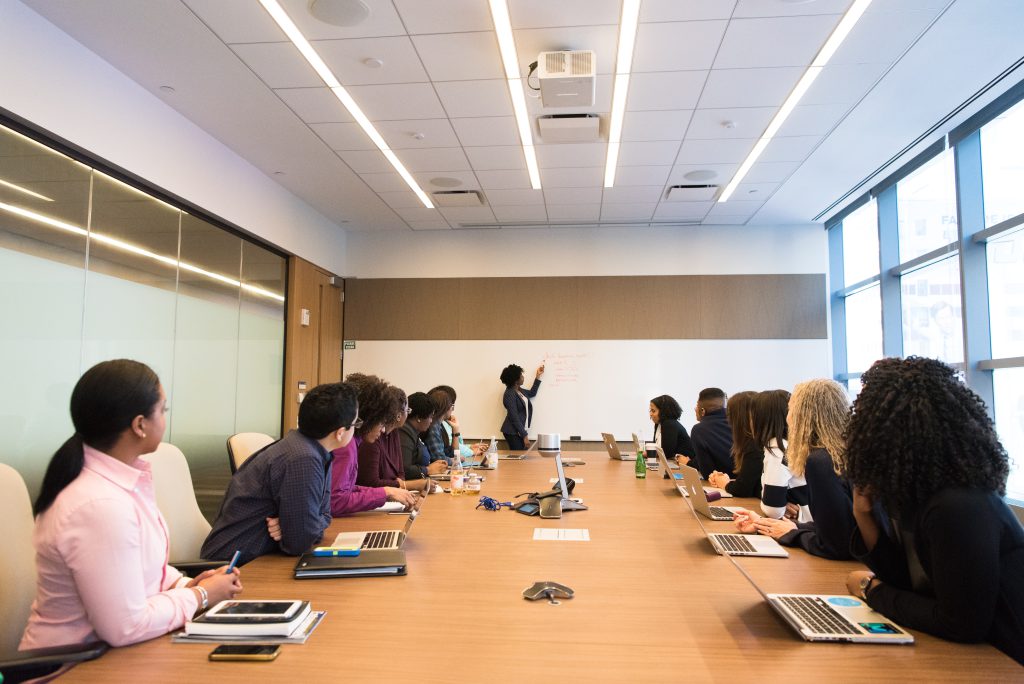Shifting from COVID-normal to “New Normal”
Published by: WCET | 3/17/2022
Tags: Leadership, Managing Digital Learning, State Authorization
Published by: WCET | 3/17/2022
Tags: Leadership, Managing Digital Learning, State Authorization
WCET welcomes Kara Monroe, President and Founder of Monarch Consulting. In partnership, WCET is launching a new article series on the continued shifts in leadership in higher education and educational technology. This is the first blog in the series and additional articles will be released over the next several months. Please enjoy the read and see the call for action at the conclusion if you would like to participate in future interviews for the series.
Thank you Kara for the thoughtful blog and tangible strategies.
~Megan Raymond, WCET

Where are we and what do we need to be thinking about?
Our offices and conference rooms are starting to look a little more like they did in February of 2020 before masks, plexiglass, and taped off chairs marking a six-foot distance became the norm for our gatherings. Yet, the impact of COVID is still hitting us all–both personally and professionally.
I sat across from a colleague recently. It was Friday afternoon, and she had just led a small team in securing the second grant of over $500K in less than a month. For her small campus, those were future altering dollars. Yet, she had little physical or mental energy to celebrate.
“Did you know I almost died of COVID?”, she asked me.
“Oh my. No, I didn’t,” I responded, stunned.
I had only started working with this colleague a couple of months ago and was now still meeting new people and learning their stories.
We sat in stillness for a moment.
“I have to keep working even though I’d like to go out on my own. My husband is self-employed, so I provide our insurance and a steady income stream. But the thought of coming back in here every single day just fills me with dread. I love the work and I love our students, but I miss the balance that I got in COVID–even though it almost killed me.”
As I started to write this article series–a series on leadership in higher education and educational technology in this “new world” – I realized that this conversation I had with my colleague captures so much of what I’m hearing from others in higher education.

COVID has caused an enormous amount of upheaval in our workforce.
First, there is a human toll. We lost colleagues to this terrible disease. Many colleagues are still suffering long term effects from having COVID. Many of us had to care for loved ones with COVID or with other diseases that were even more challenging to treat due to the COVID restrictions and the overburdening of our healthcare systems. The human toll, however, wasn’t only about the life and death aspects. From the “great resignation” to the “great retirement” we have seen colleagues leave our organizations in droves. Additionally, childcare remains a challenge as K-12 schools continue to grapple with COVID. In some cases, whole departments were decimated. One interviewee even said, “First you’d see the leader go. Then you’d see everyone in their department leave. There was no one to do the work.”
This human toll also created a complex web of resource constraints. Jobs are open that cannot be filled. People who remained in the traditional workforce are being asked to take on more and more responsibilities. Work simply doesn’t get done because there are not enough people to do the work.
Higher education is a relationship enterprise, from the relationships every faculty and staff member creates and maintains with students to the relationships in and between departments on a campus. Higher education is often as much about who you know and get to work with as it is about what you know, regardless of how much those of us in the enterprise want to deny that. With so many people moving out of jobs, between departments, and out of the institution, we have caused long held relationships to shift and change. In some cases, these moves cause wholesale changes in the culture of the institution.
Additionally, these changes in personnel also create barriers for students that we must examine. For example, one interviewee said he discovered student essays–a required part of the application process–were no longer being read by anyone in admissions. Why was no one reading them? The admission team lacked the staff to do so and departmental leadership held no belief that this would change. Yet, no one thought to remove the barrier from students to ease their enrollment to the institution. At a time when every enrollment is precious and every student retained is critical to the health of the institution, the experience students have at every point in the process matters more than ever.
Beyond the forced isolation, ongoing fear, and human toll of COVID, the world has changed and is continuing to change dramatically. If you stop to think about it, the weight can sometimes feel crushing.

Inflation is currently sitting at 7.5% for 2022–a number even higher than what was being predicted in mid to late 2021. Inflation and a Russian invasion of Ukraine have sparked concern that we will be paying continuously higher prices at the pump. Gas prices spill over into the cost of all the other goods and services we purchase as retailers seek to recoup their own costs. Higher education has already felt increased pressure in the last few years to make prices more affordable and increase access. These new inflation pressures will cause even more strain as we try to create high quality educational experiences that fit within family and adult student budgets.
We also have to find product mixes that meet the new expectations that students have about the world. While much of the United States is already facing a decline in the number of high school graduates, attracting adult students has become even more important. Adult students need and want maximum flexibility. Institutions must continue experimenting with new course modalities and program designs that will attract students and ensure a high-quality experience for which students will be willing to pay.
If I return to the conversation with my coworker that I shared earlier in this essay, I realize I would be remiss to not also discuss the experience of employees in our institutions and how we can try to better meet their needs. Her statement that having to return to the office each day filled her with dread sent a shot straight through my heart. That is no way for an employee to feel. My colleague is fortunate to have a boss who I know values and cares for her, and yet she still felt hesitant to return. While he will do what he can to look after her wellbeing, they are a part of a larger institutional culture that may not be so oriented to the wellbeing and mental health of employees.
Over the next few months, I’ll be exploring some of these topics in more depth. Through interviews and conversations with WCET members, l will also share practical ways that institutions are succeeding in these trying times. Here are a few practical ideas that I gathered from the conversations for this article:
Would you like to share your experience on some of these topics for a future article? Here are just a few questions we’re pondering in this series:
If you would like to share your story, please reach out to me via email or schedule directly using Calendly. You can share by email or schedule a time to chat. I’d love to integrate even more experiences and voices into this series.
President and Founder, Monarch Strategies LLC